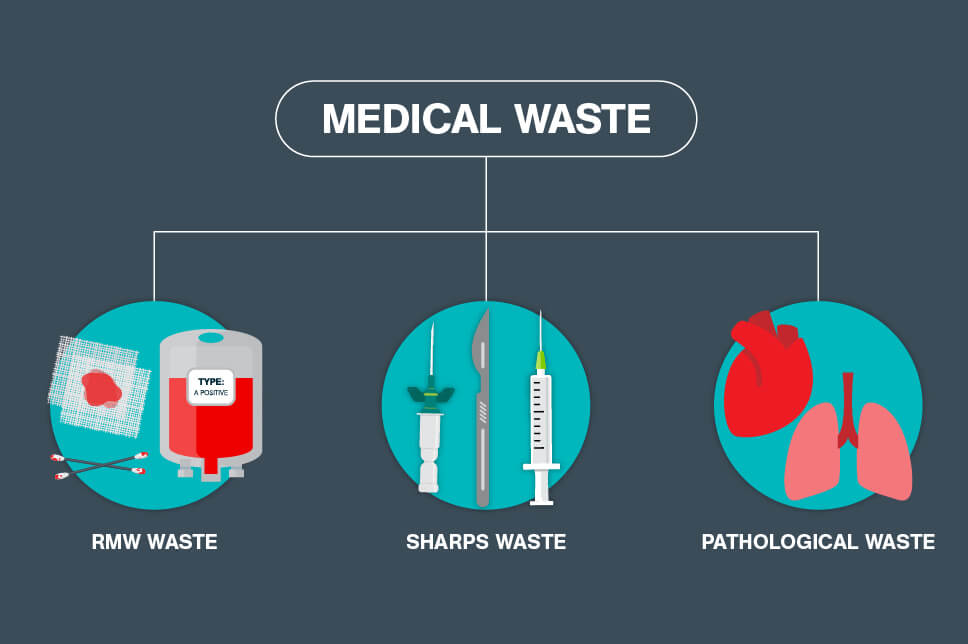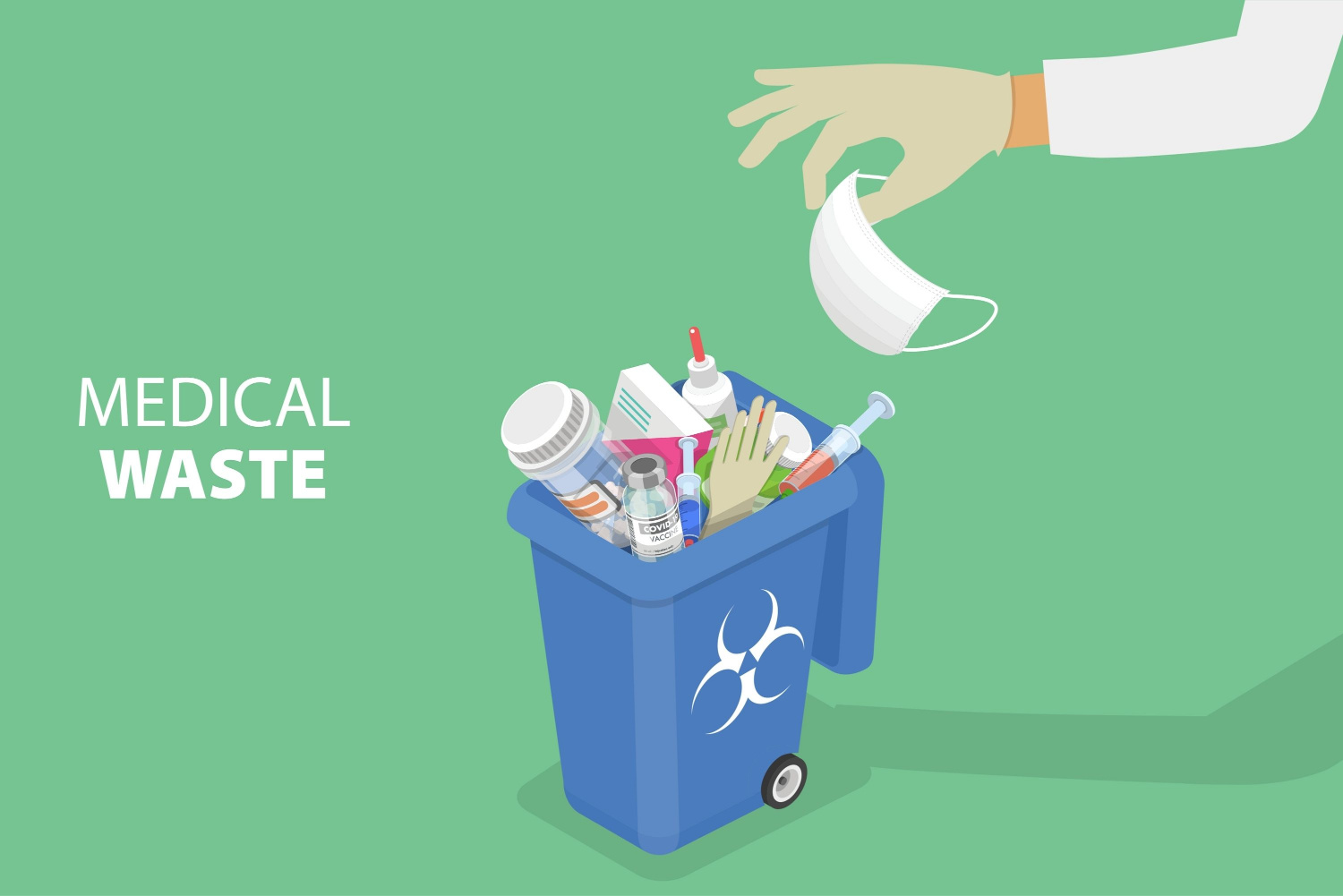Correct Disposal Methods for Medical Waste
Correct disposal strategies for medical waste are of utmost relevance in ensuring the security of both healthcare employees and the basic public. The ideal handling and disposal of medical waste is important to prevent the spread of contagious illness and the contamination of the atmosphere. This introduction will certainly discover the importance of appropriate clinical waste disposal, provide guidelines for handling different kinds of waste, and emphasize the demand for healthcare centers to take on finest techniques.
Value of Proper Clinical Waste Disposal
Proper medical garbage disposal is of utmost value in order to stop the spread of infections and shield public health. Clinical waste refers to any kind of waste created throughout medical treatments or from the healthcare sector. This waste can consist of infectious products, such as blood or bodily liquids, sharps, drugs, and other possibly dangerous compounds. Otherwise taken care of appropriately, medical waste can position significant risks to medical care employees, people, and the general public.
Among the primary factors for proper medical waste disposal is to stop the spread of infections. Clinical waste can nurture different microorganisms, including germs, infections, and other microorganisms that can trigger diseases. Improper disposal can result in the contamination of surfaces, water resources, and air, boosting the danger of infections. By securely dealing with medical waste, the chances of direct exposure to these virus are considerably lowered, making sure the safety and security of health care workers, clients, and the neighborhood at big.
Additionally, proper medical waste disposal is crucial for protecting public wellness. Medical waste that is not properly taken care of can infect soil, water bodies, and even food resources. This can lead to the transmission of conditions to humans and pets, posing a significant public health and wellness threat (WasteX Medical Waste Disposal). By adhering to proper disposal strategies, such as therapy, segregation, and containment, we can decrease the potential dangers connected with clinical waste and guard the wellness of the neighborhood.
Handling and Disposing of Sharps
When it involves the handling and disposal of sharps, adherence to proper procedures is crucial for guaranteeing the safety of medical care workers and preventing the danger of injury or infection. Sharps consist of needles, syringes, lancets, and various other things with the prospective to pierce or cut the skin. Because of their potential to transmit bloodborne virus, such as HIV and liver disease B and C, it is essential to manage and get rid of of sharps correctly.

Disposal of sharps containers need to comply with regional guidelines and standards. It is best to make use of accredited clinical waste disposal solutions that specialize in the proper handling and disposal of sharps to guarantee compliance with policies and decrease dangers to medical care workers and the environment.
Guidelines for Contagious Waste Disposal
Contagious waste, additionally understood as biomedical or biohazardous waste, refers to materials that are potentially polluted with infectious agents or other dangerous substances. Correct disposal of transmittable waste is important to ensure the safety and well-being of healthcare employees, clients, and the basic public.
The standards for contagious waste disposal differ depending on the country and neighborhood regulations, but there are some usual methods that health care centers should adhere to. All transmittable waste needs to be segregated from other types of waste at the point of generation. Infectious waste needs to be transferred and disposed of by certified waste monitoring firms that specialize in dealing with biomedical waste.
It is essential for health care centers to have extensive training programs in position to inform staff on the correct procedures for infectious waste disposal. This consists of training on waste partition, storage space, and handling techniques. By complying with these guidelines, medical care facilities can efficiently manage infectious waste, decrease the danger of infections, and shield public health and wellness.
Best Practices for Drug Waste Disposal
Pharmaceutical waste disposal need to constantly be conducted frequently and in conformity with specialist standards. Appropriate administration of pharmaceutical waste is vital to protect public wellness and the atmosphere. Drugs can present a considerable risk otherwise gotten rid of correctly, as they may pollute water sources, damage water life, or perhaps add to the advancement of antibiotic resistance.
One of the finest methods for pharmaceutical garbage disposal is to establish a designated collection system within health care facilities. medical waste disposal service. This system must include different containers for various types of pharmaceutical waste, such as run out medications, unused medications, and polluted materials. These containers ought to be plainly labeled and found in conveniently available locations to urge correct click this link disposal by health care experts
In addition, it is crucial to inform medical care staff regarding the appropriate handling and disposal of pharmaceutical waste. Training programs must concentrate on recognizing various kinds of pharmaceutical waste, comprehending the connected dangers, and complying with the suitable disposal procedures. Normal pointers and updates ought to be given to make sure conformity with disposal guidelines.
In enhancement to internal methods, healthcare centers must likewise establish partnerships with accredited waste monitoring firms. These companies concentrate on the collection, transportation, and disposal of pharmaceutical waste. By dealing with these professionals, medical care centers can ensure that their pharmaceutical waste is gotten rid of securely and in conformity with local policies.
Conformity With Legal Laws
In order to ensure conformity with legal guidelines, it is imperative for health care centers to comply with proper disposal methods for medical waste. Clinical waste positions a substantial danger to public wellness and the environment, making it important for health care facilities to manage and get rid of of it based on the regulation.
Regulative bodies, such as the Occupational Safety and Health Administration (OSHA) and the Epa (EPA), have actually established standards and demands for the proper disposal of medical waste - WasteX Medical Waste Disposal. These policies aim to shield healthcare workers, waste administration workers, and the public from potential dangers associated with medical waste

Non-compliance with legal laws can lead to extreme effects for health care facilities, including fines, lawful liabilities, damages to reputation, and possible damage to public wellness. As a result, it is crucial for medical care centers to stay current with the current guidelines and constantly monitor and improve their waste management techniques.
Verdict
Adhering to guidelines for taking care of and disposing of sharps, transmittable waste, and pharmaceutical waste is important. It is imperative that medical care facilities keep rigorous protocols for the proper disposal of medical waste to minimize risks and preserve a risk-free healthcare setting.
Medical waste refers to any type of waste created during clinical treatments or from the health care market. Contagious waste, likewise understood as biohazardous or biomedical waste, refers to products that are possibly contaminated with transmittable representatives or various other unsafe materials. All contagious waste must be set apart from other types of waste at the factor of generation. Infectious waste should be transported and disposed of by certified waste monitoring business that specialize in taking care of biomedical waste.
Sticking to standards for handling and getting rid of of sharps, contagious waste, and pharmaceutical waste is vital. (medical waste removal service)